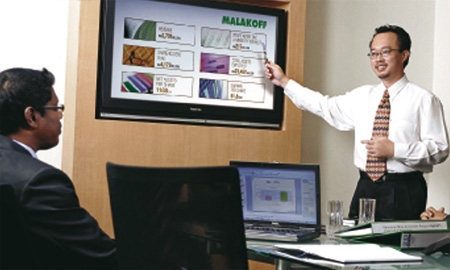According to Zainal Abidin Jalil, deputy chief executive officer of Malaysia’s largest independent power producer, the
Malakoff Corporation: “Malaysia and Malakoff have the experience, the talent and the competence to establish a sustainable business model that can incorporate new technologies, new expertise and new partners. Diversity defines us as a nation and the region around Malaysia is also very diverse. That diversity is something that we can leverage on, not just in terms of our racial makeup but in terms of our workforce. We can quickly develop a business model that will bring value to these diverse places.”
Mr Zainal says that diversity has not only strengthened Malaysian companies at home, but has helped them to successfully expand in the region and further afield. Malakoff currently boasts a presence in Jordan, Kuwait, Algeria and Saudi Arabia, and is looking to expand in India and Vietnam, where it hopes to develop as a full market player.
“We are positioning ourselves to be ready when market forces truly drive the power industry in Malaysia. We want to grow organically as a power generator; there is no question about that. Beyond that, we are interested in participating in all levels of the industry which include distribution and transmission,” says Mr Zainal.
“Going forward, Malakoff is very focused on growing outside of Malaysia. Right now we have visibility as a power and water player in the MENA (Middle East and North Africa) region. We have a very strong workforce and when we send them abroad they are able to adapt to the cultures in the countries where we operate. That has a multiplier effect for the nation and also for Malakoff as it increases the ability of our people to handle projects.”
Incorporated in 1975 as a plantation-based company, Malakoff was listed on the Kuala Lumpur Stock Exchange the following year. In 1993, it divested its plantation assets and ventured into the power sector. The company’s major shareholders include MMC Corporation (51 per cent), a UK-based independent power producer listed on the London Stock Exchange, and the Employees Provident Fund (30 per cent), a Malaysian pension fund.
Malakoff’s core business includes power generation, water desalination and operations and management services. In Malaysia, the company has an effective generation capacity of 5,020 MW, comprising six power stations that run on gas, oil and coal. Today, Malakoff is looking for local partners that can bring synergies and help the company develop its presence in areas where power supply is an economic imperative, says Mr Zainal.
Though Mr Zainal believes that Malaysia’s growing power needs must be met primarily by conventional power in the short to medium term, he says that Malakoff is interested in expanding its renewable energy capacity. “We have only started with renewable energy in recent years so we have not yet reached a point where we are scaling up big time, but everyone needs to be serious about investing in renewable energy. It is not possible in terms of scale at the moment because the power requirements have to be met by conventional means, and we need to deal with this. However, we must be prepared for renewable energy playing a bigger part and we are getting ready for it,” he says.
Another Malaysian company seeking to expand its contribution to energy and water security and to meet the demands of urban growth is
Puncak Niaga. Executive chairman Rozali Ismail says that Malaysia is still battling with escalating costs in meeting water needs in rural areas, and that progress to restructure the water sector has been slow due to overlapping interests and lack of agreement on compensation schemes that have impeded the holistic management of the sector.
Water is an essential basic human need and the continuous supply of safe, affordable and clean drinking water was a focus of the country’s 2010 Budget, 29 per cent of which was allocated to water supply and wastewater services.
Formed in 1994 to manage 30 wastewater treatment plants in Selangor and Kuala Lumpur, Puncak grew quickly, and had expanded into China by 2008, where to date it has invested over RM140 million (£29 million) in water and wastewater concession projects.
Last year, the company opened its Singaporean subsidiary, which will spearhead Puncak’s expansion into Vietnam, Cambodia and Laos, among other Asian countries. In Malaysia, Puncak is the largest water supply concessionaire, with more than 4,000 employees.
While building its capacity as a leading regional water, wastewater and environmental solutions provider, Puncak is also aiming to become a significant player in the oil and gas sector through the innovative use of its water technology.
Using cutting-edge systems and processes, Puncak hopes to collaborate with established local and international oil and gas technology service providers in developing water and wastewater applications in petrochemical plants and offshore facilities and in onshore and offshore pipeline construction.
In 2010, Puncak’s water treatment plants achieved 99.9 per cent compliance with water quality standards, delivering a combined capacity of 692 million cubic metres of treated water. Due to a higher demand for water, the group’s revenues climbed slightly last year by 1.3 per cent to RM1.9 billion (£396 million).
“There are challenges ahead of us in the 21st century. With the urbanisation process taking place, we anticipate a significant increase in the demand for water, especially in high growth areas like Selangor, Kuala Lumpur and Putrajaya. Considering the challenges of environmental pollution, and its effect on water supply, every effort should be made to protect the environment,” comments Mr Ismail.

0 COMMENTS